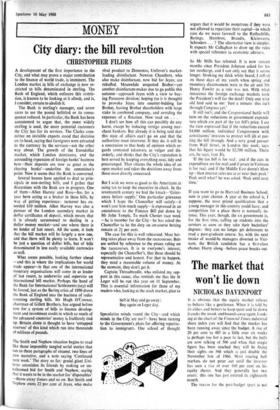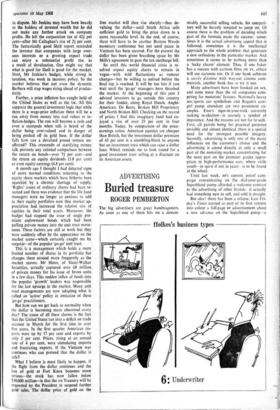The market that won't lie down
NICHOLAS DAVENPORT
It is obvious that the equity market refuses to behave like a gentleman. When it is told by its elders and betters to keep quiet and lie down it cocks the snook and bounds away again. Look- ing at the chart of the Financial Times industrial share index you will find that the market has been running away since the budget. A rise of 20 per cent to 483 in a little over six weeks is perhaps too hot a pace to last, but the bulls are now talking of 500 and when that magic figure has been reached they will be fixing their sights on 568 which is just double the November low of 1966. Most roaring bull markets do not peter out until the investor has seen a rise of over 100 per cent on his equity shares. And they generally last two years: this one has just entered its eighteenth month.
The reason for the post-budget spurt is nut in dispute. Mr Jenkins may have been beastly to the holders of invested wealth but he did not make any further attack on company profits. He left the corporation tax at 42+ per cent—after Mr Callaghan's rise of 21 per cent. The fantastically good Shell report reminded the investor that companies with large over- seas interests or a growing export trade can enjoy a substantial profit rise as a result of devaluation. One might say that what is good for Shell is good for the market.
Next, Mr Jenkins's budget, while strong in taxation, was weak in incomes policy. So the market believes That not even the dynamic Barbara will stop wages rising ahead of produc- tivity.
Further, a price inflation has caught hold of the United 'States as well as the utc. All this supports the general investment logic that while there is a wage-price inflation there will be a.
run alvay from money into real values or in- flation-hedges. The run will become a rush and even a stampede when talk is heard of the dollar being over-valued and in danger of being pushed off its gold base. If the dollar falls how can a devalued pound remain un- affected? This crescendo of scarifying money talk prevents any rational comparison between the return on bonds—over 71 per cent—and the return on equity dividends (3.8 per cent) or even equity earnings (4.8 per cent).
A rp3onth ago I thought I had detected signs of more normal conditions returning to the equity share markets which have hitherto been squeeied by a chrOnic shortage of supply. 'Rights' issues of ordinary shares had been re- sumed and there was evidence that the life fund managers were .no longer so anxious to add to their equity portfolios now that market ap- preciation had increased the relative size of equities in theii total assets. Moreover, the budget had stopped the issue of single pre- mium endowment bonds which had been pulling private money into the unit trust move- ment. These factors are still at work but, they were suddenly offset by the appearance on the market scene—which certainly caught me by surprige—of the popular `go-go' unit trust This is a management which holds a more limited number of shares in its portfolio hut.
changes them around more frequently as 'the market moves.- Mr Slater, of Slater-Walker Securities, actually captured over £8 million..
of private money for his issue of Invan -units in a few days. This sudden influx of funds into the popular 'growth' leaders was responsible for the last upsurge in the market. Many.unit trust managements are now adopting what is called an 'active' policy in imitation of these `go-go' practitioners.
But how can we- get back to normality when the dollar is becoming more abnormal every day? The cause of all these alarms is the fact that the United States ran into a deficit on trade account in March for the first time in over five years. In the first quarter American im- ports were up by 17 per cent and exports by only 3 per cent. Prices, rising at an annual rate of 4 per cent, were stimulating imports and frustrating exports. If the Vietnam war continues who can pretend that the dollar is safe?
What I believe is most likely to happen, if the flight from the dollar continues and the loss of gold at Fort Knox becomes more serious—the stock has now fallen below $10,000 million—is that the us Treasury will be requested by the President to suspend further gold. sales. The dollar price of gold on the free market will then rise sharply—thus de- valuing the dollar—until South Africa sells sufficient gold to bring the price down to a more reasonable level. In the end, of course, there will have to be another Bretton Woods monetary conference but not until peace in Vietnam has been secured. For the present the dollar has been given breathing space by Mr Mills's agreement to pass the tax surcharge bill.
So until this world financial crisis is re- solved expect equity shares to remain in vogue—with wild fluctuations as rumour changes—but be willing to unload before the final top is reached. It will be too late if you wait until the `go-go' managers have thrashed the market. At the beginning of this year I advised investors to go outside this country for their fodder, citing Royal Dutch, Anglo- American', De Beers, Broken Hill Proprietary and North Broken Hill. Checking on the record of prices I find this -imaginary fund had en- joyed a rise of over 25 per cent in four months. Today, by comparison of the price- earnings ratios, American equities are cheaper than British, but the investment dollar premium of 43 per cent is a stumbling-block to anyone but an investment trust which can raise a dollar loan. Which reminds me to look round for a good investment trust selling at a discount on its American assets.







































 Previous page
Previous page